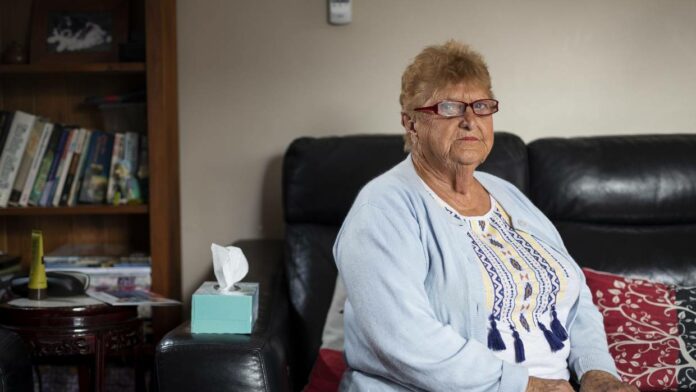A Christchurch great-grandmother with a serious respiratory disease has found herself homeless after her rental was sold.
Kathleen Coxhill, 73, spent two nights in her car after leaving the New Brighton home she had lived in since 2010 on November 4.
Two days later, struggling to breathe, she was admitted to Christchurch Hospital and treated with antibiotics.
While in hospital, the Ministry of Social Development (MSD) told her she could either go to a rest home or to emergency accommodation at the Christchurch YWCA, Coxhill said.
She was discharged to an emergency housing shelter for women at the YWCA on November 11. She has remained there since, paying $190 per week.
Coxhill had struggled to pay $220 for her previous rental.
Social housing rent would be about $115, or about 25 per cent of her weekly income of $481.45, made up of New Zealand Superannuation, an accommodation supplement and a disability allowance.
Social housing register applicants are given a “need score” out of 20 (20 being the highest need) and a priority category (A for high priority and B for lower priority).
MSD acting regional commissioner Diane McDermott said Coxhill’s priority rating of A14 reflected her urgent housing need.
“However, the supply of suitable housing is short across the country and for many people this can mean they have to wait until a suitable home becomes available.”
YWCA emergency and transitional housing for women site manager Tania Anderson said she was shocked at Coxhill’s priority rating.
“You can sit for ages at a rating that low, she needs to be between an A17 or A20 to get a house quickly.”
Anderson said she thought a mistake had been made given Coxhill’s age and health conditions.
The pensioner is among a growing group of older Kiwis who are finding themselves priced out of the rental market.
Age Concern Canterbury chief executive Simon Templeton said several people approached the agency for help with accommodation before Christmas.
The agency tried to help people find a rental but often found cheaper properties were substandard and cold, he said.
He was surprised Coxhill had not been found a home by MSD given her situation.
“A homeless 70 plus-year-old, I would argue, should be very very top of the list.”
Coxhill said she has been lonely since staying at the YWCA as she is not allowed visitors due to security concerns for other guests.
“I’m a social person, I’ve always been a social person and I find it lonely.”
Coxhill had previously worked in rest homes and believed patients were not treated well due to poor resourcing.
She first applied for social housing with support from her GP in 2014 but was turned down as she was working as a carer and did not meet the income requirements.
She was forced to retire in 2016 due to deteriorating health.
She struggled to pay her $220 weekly rent and escalating power bills for the draughty, earthquake-damaged home, and was also paying off loans for a car and a cellphone.
Coxhill’s GP wrote a second letter supporting her need for subsidised housing.
She was accepted that time, but was deemed low priority as she was unable to provide evidence of the earthquake damage despite requesting a letter from her landlord between 2014 and 2018.
She continued to look for another private rental but was reluctant to borrow money from MSD for a bond.
That year she turned down a Christchurch City Council-owned unit as it was poorly heated and would not have been suitable for her health needs.
Her priority status was increased to A14 on November 22 after she moved into emergency accommodation.
Just under 14,000 people were waiting for public housing across New Zealand, according to the most recent quarterly housing report in September 2019.
The average waiting time for public housing was 116 days.
Source - stuff





























